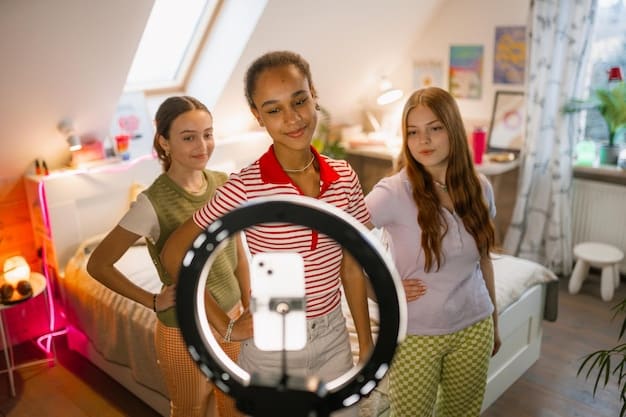TikTok Star Legality: Copyright Laws & Legal Issues in 2025

Understanding TikTok star legality in 2025 involves navigating complex copyright laws, licensing agreements, and potential legal pitfalls to ensure content creation remains lawful and sustainable.
Being a TikTok star in 2025 means more than just creating viral content; it involves understanding the legal landscape. Navigating TikTok star legality: Understanding copyright laws and avoiding legal issues on TikTok in 2025 is crucial to protect your content and avoid potential lawsuits.
Understanding Copyright Law for TikTok Content in 2025
Copyright law is the cornerstone of content creation, especially on platforms like TikTok. Understanding how copyright works is essential for TikTok star legality: Understanding copyright laws and avoiding legal issues on TikTok in 2025.
What is Copyright?
Copyright protects original works of authorship, including videos, music, and other creative content. This protection extends to the creator, granting them exclusive rights to use, reproduce, and distribute their work.
How Copyright Relates to TikTok
On TikTok, copyright law is critical because many users incorporate existing music, video clips, or other copyrighted material into their content. Using copyrighted material without permission can lead to takedown requests, account suspensions, or even lawsuits.
Here are some key aspects of copyright law for TikTok creators:
- Original Content: Creating original content provides the strongest protection under copyright law.
- Fair Use: Understanding the concept of “fair use” can help you determine if you can use copyrighted material for commentary, criticism, or educational purposes.
- Licensing: Obtaining the proper licenses for music or other copyrighted materials is essential for lawful content creation.
To ensure you are not infringing on anyone’s copyright, always seek permission or use royalty-free or Creative Commons-licensed content. By doing so, you’ll safeguard your TikTok career and maintain TikTok star legality: Understanding copyright laws and avoiding legal issues on TikTok in 2025.
Navigating Music Licensing for TikTok Videos
Music is a fundamental element of many TikTok videos, but using copyrighted music without the correct licenses can lead to legal problems. Proper music licensing is vital for TikTok star legality: Understanding copyright laws and avoiding legal issues on TikTok in 2025.
Why Music Licensing Matters
Music licensing ensures that artists and copyright holders are compensated for the use of their work. Failing to obtain the necessary licenses can result in copyright infringement claims, which can be costly and damaging to your reputation.
Types of Music Licenses
There are several types of music licenses that TikTok creators should be aware of:
- Synchronization License: Grants permission to use a musical work in a video.
- Master Use License: Grants permission to use a specific recording of a song.
- Public Performance License: Required for streaming or broadcasting music publicly.

TikTok has licensing agreements with many major record labels and music publishers, allowing users to access a vast library of music. However, it’s essential to understand the terms of these agreements and whether they cover your intended use.
To stay compliant, consider these tips:
- Use music from TikTok’s built-in library, which typically includes licensed songs.
- Obtain direct licenses from artists or music publishers when necessary.
- Explore royalty-free music options from reputable providers.
By understanding and adhering to music licensing requirements, TikTok creators can ensure TikTok star legality: Understanding copyright laws and avoiding legal issues on TikTok in 2025 and create engaging content without legal repercussions.
Understanding Fair Use and Avoiding Infringement on TikTok
Fair use is a legal doctrine that allows the limited use of copyrighted material without permission from the copyright holder. However, it’s crucial to understand the boundaries of fair use to maintain TikTok star legality: Understanding copyright laws and avoiding legal issues on TikTok in 2025.
What is Fair Use?
Fair use generally applies to commentary, criticism, parody, news reporting, education, and research. The use must be transformative, meaning it adds new expression, meaning, or message to the original work.
Factors Determining Fair Use
Courts consider several factors when determining whether a particular use is fair:
- Purpose and character of the use: Is it commercial or non-profit? Is it transformative?
- Nature of the copyrighted work: Is it factual or creative?
- Amount and substantiality of the portion used: How much of the original work was used?
- Effect of the use on the potential market: Does it harm the market for the original work?
Using copyrighted content for criticism, commentary, or educational purposes can sometimes fall under fair use. However, it’s essential to analyze each situation carefully. Using copyrighted material must not harm the original work’s market value or commercial potential.
Navigating fair use can be complex, so consult with legal counsel if you are unsure whether your use is permissible. Knowing the guidelines around fair use helps guarantee TikTok star legality: Understanding copyright laws and avoiding legal issues on TikTok in 2025.
Rights of Publicity and Privacy on TikTok
Beyond copyright, rights of publicity and privacy are crucial for maintaining TikTok star legality: Understanding copyright laws and avoiding legal issues on TikTok in 2025. These rights protect individuals from the unauthorized use of their likeness or personal information.
What are Rights of Publicity?
Rights of publicity protect an individual’s right to control the commercial use of their name, image, or likeness. On TikTok, this means you generally cannot use someone’s image or persona to promote your content or products without their consent.
Protecting Privacy on TikTok
Privacy laws protect individuals from the unauthorized collection, use, and disclosure of their personal information. On TikTok, it’s crucial to respect the privacy of others and avoid sharing sensitive information without consent.

Here are some guidelines to follow:
- Obtain Consent: Always get permission before filming or sharing content featuring other individuals.
- Avoid Defamation: Ensure your content is truthful and does not defame or disparage others.
- Respect Boundaries: Be mindful of privacy expectations, especially in public spaces.
Adhering to these rights is vital to avoid legal pitfalls. Always seek consent and be respectful of others’ privacy to ensure TikTok star legality: Understanding copyright laws and avoiding legal issues on TikTok in 2025 are upheld.
Using Disclaimers and Legal Notices on Your TikTok Profile
Disclaimers and legal notices are essential tools for managing legal risks on TikTok. Incorporating these elements into your profile and content can help establish TikTok star legality: Understanding copyright laws and avoiding legal issues on TikTok in 2025.
Why Disclaimers Matter
Disclaimers provide important information to viewers and can limit your liability in certain situations. They can address various issues, such as the accuracy of information, sponsorship disclosures, and endorsements.
Types of Disclaimers to Consider
Here are some common types of disclaimers:
- Accuracy Disclaimer: States that the information provided is for general purposes only and may not be entirely accurate.
- Sponsorship Disclosure: Informs viewers that a video is sponsored or includes paid endorsements.
- Liability Disclaimer: Limits your liability for any harm or damages resulting from the use of your content.
Legal notices provide viewers with essential information about your content, its purpose, and any legal limitations. These notices can help clarify your intent and protect you from potential misunderstandings or legal claims.
By including appropriate disclaimers and legal notices on your TikTok profile and in your videos, you can manage legal risks and protect yourself from potential liabilities. These elements are crucial for maintaining TikTok star legality: Understanding copyright laws and avoiding legal issues on TikTok in 2025.
Staying Updated on TikTok’s Terms of Service and Community Guidelines
TikTok’s terms of service and community guidelines are the rulebook for using the platform. Staying informed about these guidelines is crucial for ensuring TikTok star legality: Understanding copyright laws and avoiding legal issues on TikTok in 2025.
Why TikTok’s Guidelines Matter
TikTok regularly updates its terms and guidelines to address new issues and challenges. Violating these terms can result in content removal, account suspension, or even permanent bans.
How to Stay Updated
Here are some tips for staying informed:
- Regularly Review: Check the terms of service and community guidelines periodically for updates.
- Follow Announcements: Stay tuned to official announcements from TikTok regarding policy changes.
- Engage with the Community: Participate in discussions and forums to learn about common issues and best practices.
To succeed on TikTok, ensure you fully understand regulations to enable TikTok star legality: Understanding copyright laws and avoiding legal issues on TikTok in 2025. Always follow TikTok’s TOS.
| Key Point | Brief Description |
|---|---|
| 🎵 Music Licensing | Using licensed music avoids copyright issues. |
| ⚖️ Fair Use | Understanding limits prevents infringement. |
| 🛡️ Disclaimers | Using them reduces liability. |
| 📜 TOS Updates | Staying updated ensures compliance. |
FAQ Section
▼
Using copyrighted music without permission can lead to your video being taken down, your account being suspended, or even legal action from the copyright holder.
▼
The best ways to avoid copyright issues are to use original content, obtain proper licenses for copyrighted material, or utilize content that falls under fair use guidelines.
▼
TikTok updates its terms of service and community guidelines periodically, so it’s important to check for updates regularly to stay informed about any changes.
▼
If someone uses your content without permission, you can file a copyright infringement notice with TikTok to have the content removed.
▼
Yes, there are many royalty-free music options available for TikTok creators. Several websites offer royalty-free music that can be used without needing to obtain additional licenses.
Conclusion
Navigating the legal landscape of TikTok stardom in 2025 requires a solid understanding of copyright law, music licensing, rights of publicity, and TikTok’s own guidelines. By staying informed and proactive, you can protect your content, avoid legal pitfalls, and continue to thrive as a creator on the platform.





